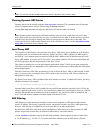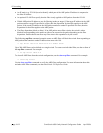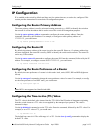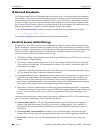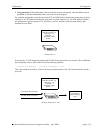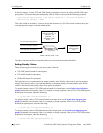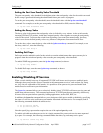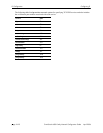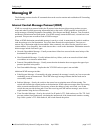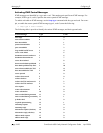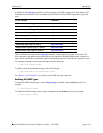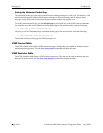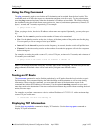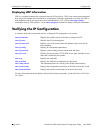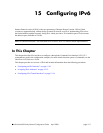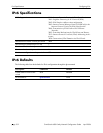
Configuring IP Managing IP
OmniSwitch 6600 Family Network Configuration Guide April 2006 page 14-19
Managing IP
The following sections describe IP commands that can be used to monitor and troubleshoot IP forwarding
on the switch.
Internet Control Message Protocol (ICMP)
ICMP is a network layer protocol within the IP protocol suite that provides message packets to report
errors and other IP packet processing information back to the source. ICMP generates several kinds of
useful messages, including Destination Unreachable, Echo Request and Reply, Redirect, Time Exceeded,
and Router Advertisement and Solicitation. If an ICMP message cannot be delivered, a second one is not
generated. This prevents an endless flood of ICMP messages.
When an ICMP destination-unreachable message is sent by a switch, it means that the switch is unable to
send the package to its final destination. The switch then discards the original packet. There are two
reasons why a destination might be unreachable. Most commonly, the source host has specified a non-
existent address. Less frequently, the switch does not have a route to the destination. Destination-unreach-
able messages include four basic types:
• Network-Unreachable Message—Usually means that a failure has occurred in the route lookup of the
destination IP in the packet.
• Host-Unreachable Message—Usually indicates delivery failure, such as an unresolved client's hard-
ware address or an incorrect subnet mask.
• Protocol-Unreachable Message—Usually means that the destination does not support the upper-layer
protocol specified in the packet.
• Port-Unreachable Message—Implies that the TCP/UDP socket or port is not available.
Additional ICMP messages include:
• Echo-Request Message—Generated by the ping command, the message is sent by any host to test node
reachability across an internetwork. The ICMP echo-reply message indicates that the node can be
successfully reached.
• Redirect Message—Sent by the switch to the source host to stimulate more efficient routing. The
switch still forwards the original packet to the destination. ICMP redirect messages allow host routing
tables to remain small because it is necessary to know the address of only one switch, even if that
switch does not provide the best path. Even after receiving an ICMP redirect message, some devices
might continue using the less-efficient route.
• Time-Exceeded Message—Sent by the switch if an IP packet’s TTL field reaches zero. The TTL field
prevents packets from continuously circulating the internetwork if the internetwork contains a routing
loop. Once a packet’s TTL field reaches 0, the switch discards the packet.



